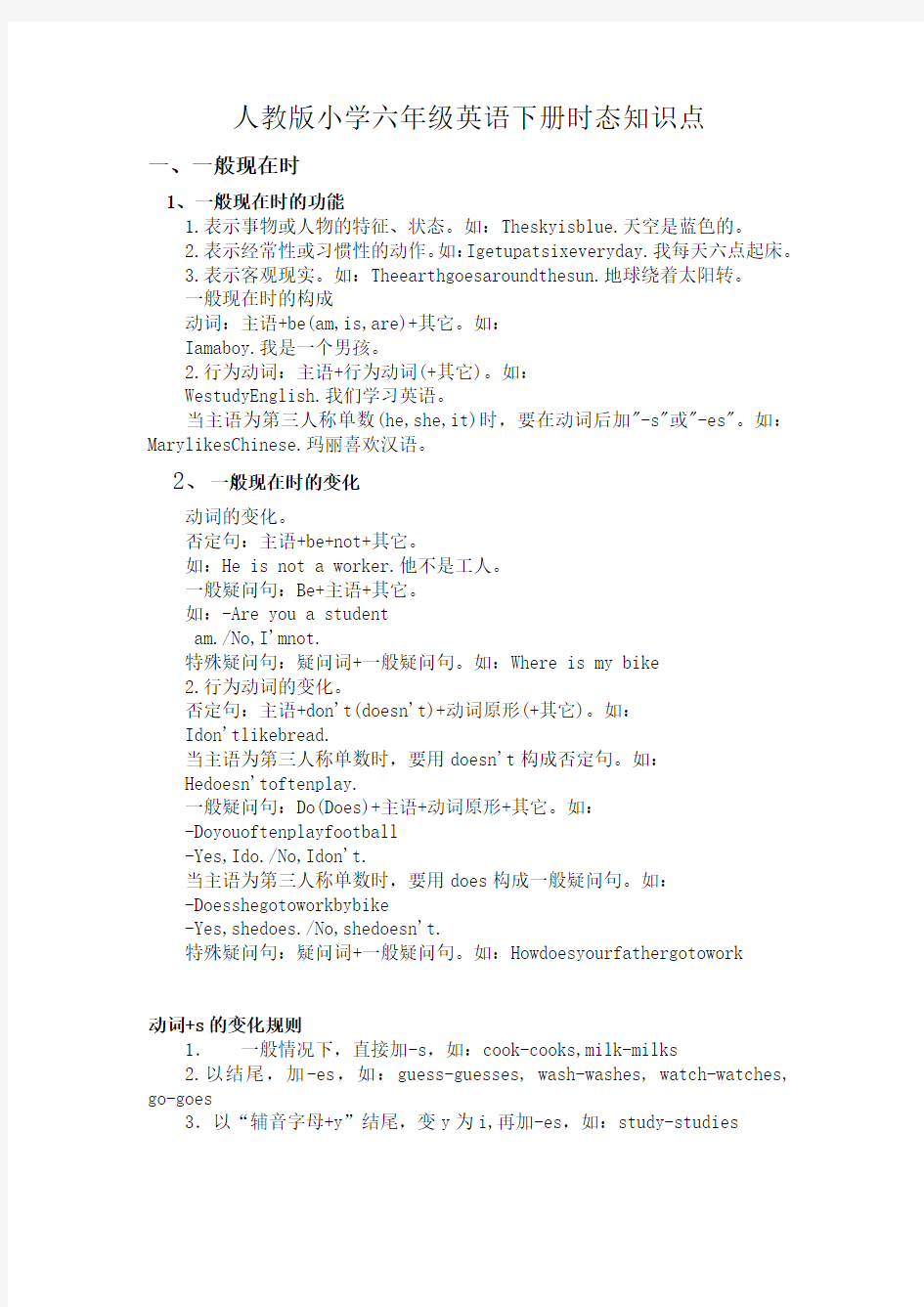
2018人教小学六年级英语下册时态知识点
- 格式:doc
- 大小:22.50 KB
- 文档页数:5


人教版小学六年级英语下册时态知识点
一、一般现在时
1、一般现在时的功能
1.表示事物或人物的特征、状态。如:Theskyisblue.天空是蓝色的。
2.表示经常性或习惯性的动作。如:Igetupatsixeveryday.我每天六点起床。
3.表示客观现实。如:Theearthgoesaroundthesun.地球绕着太阳转。
一般现在时的构成
动词:主语+be(am,is,are)+其它。如:
Iamaboy.我是一个男孩。
2.行为动词:主语+行为动词(+其它)。如:
WestudyEnglish.我们学习英语。
当主语为第三人称单数(he,she,it)时,要在动词后加"-s"或"-es"。如:MarylikesChinese.玛丽喜欢汉语。
2、一般现在时的变化
动词的变化。
否定句:主语+be+not+其它。
如:He is not a worker.他不是工人。
一般疑问句:Be+主语+其它。
如:-Are you a student
am./No,I'mnot.
特殊疑问句:疑问词+一般疑问句。如:Where is my bike
2.行为动词的变化。
否定句:主语+don't(doesn't)+动词原形(+其它)。如:
Idon'tlikebread.
当主语为第三人称单数时,要用doesn't构成否定句。如:
Hedoesn'toftenplay.
一般疑问句:Do(Does)+主语+动词原形+其它。如:
-Doyouoftenplayfootball
-Yes,Ido./No,Idon't.
当主语为第三人称单数时,要用does构成一般疑问句。如:
-Doesshegotoworkbybike
-Yes,shedoes./No,shedoesn't.
特殊疑问句:疑问词+一般疑问句。如:Howdoesyourfathergotowork
动词+s的变化规则
1.一般情况下,直接加-s,如:cook-cooks,milk-milks
2.以结尾,加-es,如:guess-guesses, wash-washes, watch-watches, go-goes
3.以“辅音字母+y”结尾,变y为i,再加-es,如:study-studies
3、一般现在时用法专练:
一、写出下列动词的第三人称单数
drink________go_______stay________make________
look_________have_______pass_______carry____
come________watch______plant_______fly________
study_______brush________do_________teach_______
二、用括号内动词的适当形式填空。
(have)dinnerathome.
(be)inClassOne.
(notwatch)TVonMonday.
(notgo)tothezooonSunday.
(like)theWorldCup
(do)onSaturdays
(read)newspaperseveryday
(teach)usEnglishonSundays.
(take)awalktogethereveryevening.
(be)somewaterinthebottle.
(like)cooking.
(have)thesamehobby.
(look)afterherbabycarefully.
(do)yourhomeworkwell.
(be)’mstayinginbed.
(go)toschoolfromMondaytoFriday.
(do)notlikePE.
(watch)TVintheevening.
(have)eightlessonsthisterm.
20.-Whatday_______(be)ittoday
HapyⅥ。④英语(4) 21:02:45
二、现在进行时
1.现在进行时表示现在正在进行或发生的动作,也可表示当前一段时间内的活动或现阶段正在进行的动作。
2.现在进行时的肯定句基本结构为be+动词ing.
3.现在进行时的否定句在be后加not。
4.现在进行时的一般疑问句把be动词调到句首。
5.现在进行时的特殊疑问的基本结构为:
疑问词 + be + 主语 + 动词ing
但疑问词当主语时其结构为:
疑问词 + be + 动词ing
动词加ing的变化规则
1.一般情况下,直接加ing,如:cook-cooking
2.以不发音的e结尾,去e加ing,如:make-making, taste-tasting
3.如果末尾是一个元音字母和一个辅音字母,双写末尾的辅音字母,再加ing,
如:run-running, stop-stopping
现在进行时专项练习:
一、写出下列动词的现在分词:
play________ run__________ swim _________make__________
go_________ like________ write________ _ski___________
read________ have_________ sing ________ dance_________
put_________ see________ buy _________ love____________
live_______ take_________ come ________ get_________
stop_________ sit ________ begin________ shop___________
二、用所给的动词的正确形式填空:
boy __________________ ( draw)a picture now.
2. Listen .Some girls _______________ ( sing)in the classroom .
3. My mother _________________ ( cook )some nice food now.
4. What _____ you ______ ( do ) now
5. Look . They _______________( have) an English lesson .
____________(not ,water) the flowers now.
! the girls ________________(dance )in the classroom .
is our granddaughter doing She _________(listen ) to music.
9. It’s 5 o’clock now. We _____________(have)supper now
(wash )clothes Yes ,she is .
HapyⅥ。④英语(4) 21:03:25
三、一般将来时
一、概念:表示将要发生的动作或存在的状态及打算、计划或准备做某事。句中一般有以下时间状语:tomorrow, next day(week, month, year…),soon, the day after tomorrow(后天)等。
二、基本结构:①be going to + do;
②will+ do.
三、否定句:在be动词(am, is, are)l后加not或情态动词will后加not 成won’t。
例如:I’m going to have a picnic this afternoon.→ I’m not going to have
a picnic this afternoon.
四、一般疑问句: be或will提到句首,some改为any, and改为or,第一二人称互换。
例如:We are going to go on an outing this weekend. → Are you going to go on an outing this weekend
五、对划线部分提问。一般情况,一般将来时的对划线部分有三种情况。
1. 问人。Who 例如:I’m going to New York soon. →Who’s going to New York soon.
2. 问干什么。What … do.例如: My father is going to watch a race with me this
afternoon. →What is your father going to do with you this afternoon.
3. 问什么时候。When.例如:She’s going to go to bed at nine. →When